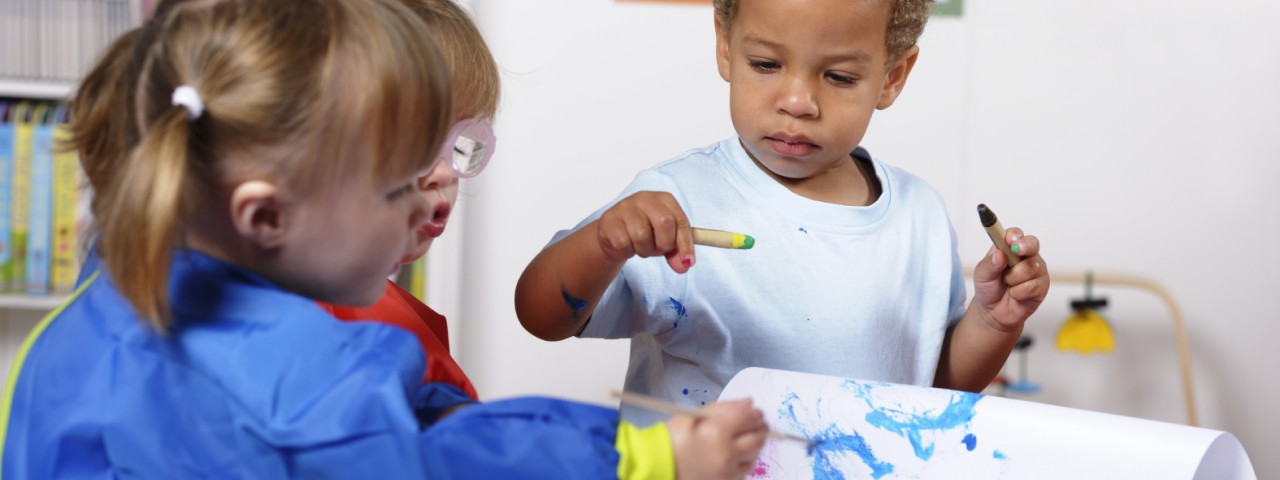Kindergarten Requires Flexible Plans for Teachers
- Tweet

Kids excitedly greeting friends, parents coordinating carpool schedules, older students introducing their younger siblings to former teachers: it’s kindergarten registration day.
Each year near the end of July, parents arrive at their child’s new school to enroll him for the coming school year and to give him the opportunity to meet his new teacher. And for the past three years, members from the policy group of the Urban Child Institute have been there to witness the excitement.
“We love it because it’s an opportunity for us to come down from the ivory tower and be in the action,” says Pete Albrecht. “It’s a big treat for us.”
Kindergarten Readiness is a Broad Topic
In addition to assisting the teachers with their tasks on what can be a chaotic day, helping make copies or translating for parents, the UCI members are there to conduct research on the topic of “kindergarten readiness.” This term, although it can have different meanings for people, includes a few main skills that children entering kindergarten should have including language; cognitive, such as the ability to arrange items from heaviest to lightest; self-control, including the ability to sit still for a reasonable amount of time or solve a problem without biting or hitting; and self-confidence—willingness to explore outside the realm of familiarity.
By including surveys in the parents’ registration packets, the UCI team is able to gather information on how a specific variable affects a child’s readiness. While they all pertain to early learning, the questions have recently gravitated toward the subject of parent/child interactions.
“Ready” Begins Long Before Registration Day
“The literature suggests that there are large categories of activities that parents can engage in that are helpful for kids,” says Dr. Doug Imig. “One set has to do with early learning and another with establishing healthy routines. So, this year’s survey looked to see if the stronger readiness scores among children are a function of family engagement in early learning or a function of building healthy transition routines.”
These questions include whether the children have a set time for certain activities, such as going to bed, brushing their teeth, eating meals, and playing. After the results are, for privacy reasons, de-identified by Shelby County schools, they are sent to the UCI. There they are compared to results from the kindergarten readiness indicator—a test taken by every entering kindergarten student—in order to determine what link may exist between family routines and kindergarten readiness.
For a teacher, before she even knows a child’s family background, it is clear whether he is ready for kindergarten from the start.
Experienced Teacher can Spot “Readiness” Right Away
“A kid who is kindergarten ready comes very much prepared on day one to start working toward what we want for the year,” says one kindergarten teacher working in the achievement school district. “But some kids come in and we realize that we need to adjust what we had planned.”
While kindergarten is just the first step of the formal education process, the research continues to indicate the importance of the years leading up to it, as well as the negative consequences of starting out unprepared. Fortunately, there are steps that all parents can take toward promoting readiness.
Parents Play a Critical Role Early
“Parents are a child’s first teacher (tweet this!) and there are a lot of basic things that they can do to help their baby dramatically—like simply talking, reading to, or interacting with him,” says Pete. “What we advocate, especially with the kindergarten readiness research, is that there are cheap—basically free—ways to improve the lives of people.”
Despite the seeming simplicity of such interactions, the effects are obvious.
“The kids that are most ready—picking things up really quickly and very in tune with what we’re doing in school—seem like they’ve had exposure to many different things at home,” according to the same kindergarten teacher. “If they’re cognitively developed, you can tell they have been exposed to many people talking to them, a lot of vocabulary, and opportunities to play and explore when they were younger, before kindergarten. Overall, these experiences make them more receptive to anything we talk about in school.”
For now, although much remains to be learned about the subject, it is clear that entering kindergarten ready is extremely important for a child, and that the steps a parent can take to help are very basic, yet yield lasting results.
“When children reach kindergarten ready to thrive—when they have a rich foundation in language, a set of developing critical thinking skills, an age-appropriate level of self-control, and a growing sense of self-confidence, they enjoy a profound advantage,” says Dr. Imig. “They are much more likely to enjoy school, be curious about the world around them, get along well with their classmates, and become early readers. A kindergarten ready child is on a pathway to success.”
